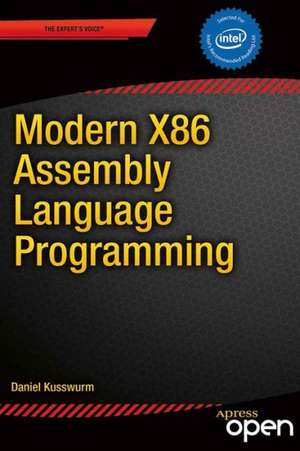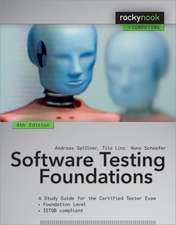Modern X86 Assembly Language Programming: 32-bit, 64-bit, SSE, and AVX
Autor Daniel Kusswurmen Limba Engleză Paperback – 24 noi 2014
Please note:Book appendixes can be downloaded here: http://www.apress.com/9781484200650
Major topics of the book include the following:
- 32-bit core architecture, data types, internal registers, memory addressing modes, and the basic instruction set
- X87 core architecture, register stack, special purpose registers, floating-point encodings, and instruction set
- MMX technology and instruction set
- Streaming SIMD extensions (SSE) and Advanced Vector Extensions (AVX) including internal registers, packed integer arithmetic, packed and scalar floating-point arithmetic, and associated instruction sets
- 64-bit core architecture, data types, internal registers, memory addressing modes, and the basic instruction set
- 64-bit extensions to SSE and AVX technologies
- X86 assembly language optimization strategies and techniques
| Toate formatele și edițiile | Preț | Express |
|---|---|---|
| Paperback (2) | 259.62 lei 38-44 zile | |
| Apress – 9 sep 2023 | 354.54 lei 3-5 săpt. | |
| Apress – 24 noi 2014 | 259.62 lei 38-44 zile |
Preț: 259.62 lei
Preț vechi: 324.52 lei
-20% Nou
Puncte Express: 389
Preț estimativ în valută:
49.68€ • 51.68$ • 41.02£
49.68€ • 51.68$ • 41.02£
Carte tipărită la comandă
Livrare economică 10-16 aprilie
Preluare comenzi: 021 569.72.76
Specificații
ISBN-13: 9781484200650
ISBN-10: 1484200659
Pagini: 500
Ilustrații: Bibliographie
Dimensiuni: 152 x 229 x 40 mm
Greutate: 1.01 kg
Ediția:1st ed.
Editura: Apress
Colecția Apress
Locul publicării:Berkeley, CA, United States
ISBN-10: 1484200659
Pagini: 500
Ilustrații: Bibliographie
Dimensiuni: 152 x 229 x 40 mm
Greutate: 1.01 kg
Ediția:1st ed.
Editura: Apress
Colecția Apress
Locul publicării:Berkeley, CA, United States
Public țintă
Popular/generalCuprins
Preface/foreword
1: X86-32 Core Architecture
2: X86-32 Core Architecture Programming
3: X87 Floating Point Unit
4: X87 Floating Point Unit Programming
5: MMX Technology
6: MMX Programming
7: Streaming SIMD Extensions (SSE)
8: X86-SSE Programming – Scalar Floating-Point
9: X86-SSE Programming – Packed Floating-Point
10: X86-SSE Programming – Packed Integers
11: X86-SSE Programming – Text Strings
12: Advanced Vector Extensions (AVX)
13: X86-AVX Programming – Scalar Floating-Point
14: X86-AVX Programming – Packed Floating-Point
15: X86-AVX Programming – Packed Integers
16: X86-AVX Programming – New Instructions
17: X86-64 Core Architecture
18: X86-64 Core Architecture Programming
19: X86-64 SIMD Architecture
20: X86-64 SIMD Programming
21: Advanced Topics and Optimization Techniques
22: Advanced Topics Programming
1: X86-32 Core Architecture
2: X86-32 Core Architecture Programming
3: X87 Floating Point Unit
4: X87 Floating Point Unit Programming
5: MMX Technology
6: MMX Programming
7: Streaming SIMD Extensions (SSE)
8: X86-SSE Programming – Scalar Floating-Point
9: X86-SSE Programming – Packed Floating-Point
10: X86-SSE Programming – Packed Integers
11: X86-SSE Programming – Text Strings
12: Advanced Vector Extensions (AVX)
13: X86-AVX Programming – Scalar Floating-Point
14: X86-AVX Programming – Packed Floating-Point
15: X86-AVX Programming – Packed Integers
16: X86-AVX Programming – New Instructions
17: X86-64 Core Architecture
18: X86-64 Core Architecture Programming
19: X86-64 SIMD Architecture
20: X86-64 SIMD Programming
21: Advanced Topics and Optimization Techniques
22: Advanced Topics Programming
Notă biografică
Daniel
Kusswurm
has
over
30
years
of
professional
experience
as
a
software
developer
and
computer
scientist.
During
his
career,
he
has
developed
innovative
software
for
medical
devices,
scientific
instruments,
and
image
processing
applications.
On
most
of
these
projects,
he
successfully
employed
x86
assembly
language
to
significantly
improve
the
performance
of
computationally-intense
algorithms
or
solve
unique
programming
challenges.
His
educational
background
includes
a
BS
in
Electrical
Engineering
Technology
along
with
an
MS
and
PhD
in
Computer
Science.
Textul de pe ultima copertă
This book is an instructional text that will teach you how to code x86-64 assembly language functions. It also explains how you can exploit the SIMD capabilities of an x86-64 processor using x86-64 assembly language and the AVX, AVX2, and AVX-512 instruction sets.
This updated edition’s content and organization are designed to help you quickly understand x86-64 assembly language programming and the unique computational capabilities of x86 processors. The source code is structured to accelerate learning and comprehension of essential x86-64 assembly language programming constructs and data structures. Modern X86 Assembly Language Programming, Third Edition includes source code for both Windows and Linux. The source code elucidates current x86-64 assembly language programming practices, run-time calling conventions, and the latest generation of software development tools.
You will:
- Understand important details of the x86-64 processor platform, including its core architecture, data types, registers, memory addressing modes, and the basic instruction set
- Use the x86-64 instruction set to create assembly language functions that are callable from C++
- Create assembly language code for both Windows and Linux using modern software development tools including MASM (Windows) and NASM (Linux)
- Employ x86-64 assembly language to efficiently manipulate common data types and programming constructs including integers, text strings, arrays, matrices, and user-defined structures
- Explore indispensable elements of x86 SIMD architectures, register sets, and data types.
- Master x86 SIMD arithmetic and data operations using both integer and floating-point operands
- Harness the AVX, AVX2, and AVX-512 instruction sets to accelerate the performance of computationally-intense calculations in machine learning, image processing, signal processing, computer graphics, statistics, and matrix arithmetic applications
- Apply leading-edge coding strategies to optimally exploit the AVX, AVX2, and AVX-512 instruction sets for maximum possible performance
Caracteristici
Includes chapters dedicated to x86-64 SIMD programming and related AVX, AVX2, and AVX-512 instruction sets Explains x86-64 assembly language programming for Windows and Linux using modern software development tools Expounds essential x86-64 assembly language programming concepts and SIMD coding techniques













